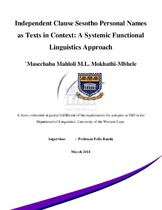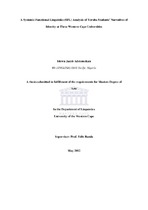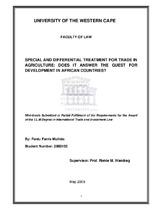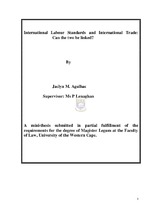| dc.description.abstract | This study sought to examine independent clause Sesotho personal names as authentic social discourse using the Systemic Functional Linguistics (SFL) theory. It sought to analyze their structure and map them to social functions to demonstrate that they are enacted messages in socio-cultural context of Basotho. It used a form-meaning approach to interpret Sesotho names in socio-cultural contexts of use (cf. Halliday 1994, 2001, Eggins, 1996, 2004 and Martin & Rose 2007) as an alternative to the current formalist approach to onomastica interpretation. The SFL analysis was compared and contrasted mainly with the formalist syntactic specific and semantic specific analyses currently in use by Guma, Sesotho Academy and subsequent authors
of Sesotho grammar and other linguists. The purpose of displaying these names as texts in social context enfolded the intent to reflect a systemic interface of lexico-grammar and social activity. The study used the clause-text-culture paradigm to explore Sesotho names as texts or semantic units. The idea was to access their
‘meanings beyond the clause’ (Martin & Rose 2007). Data was collected from national examinations pass lists, admission and employment roll lists from Public, Private, Tertiary, Orphanage institutions. Other data was identified in Telephone directories and Media. The purely linguistic lexico-grammatic analysis of the structure of names was supplemented by interview data from real interpretations from families, owners and senior citizens who have social and cultural knowledge of the meanings of some names.
The study has established that Sesotho personal names can present as an independent clause feature. Sesotho personal names can also be described as lexico-grammatical properties and are meaningful in social contexts. They are used to exchange information as statements, demands and commands, and as questions and as exclamations. This means that these names can be categorized according to Halliday’s Mood types which make them function as declaratives, imperatives, interrogatives and exclamatives depending on the awarder’s evaluation. The study also finds that in negotiating attitudes, modality is highly incorporated. The study concludes that Sesotho names conform to the logical structures of the nominal group and the verbal group and these groups reciprocate in use. The verbal group is the core constituent in these names and it serves as a foundation for the nominal and verbal groups particularly because they function as reciprocating propositions. This includes the names with
the sub-modification features. This extends the formalist description of Sesotho independent clause in that the identified sub-modifications which are opague and taken for granted by formalist analysts of Sesotho, are explicated as essential elements embedded in the formmeaning relation in SFL. The main contribution is that this is the only study on SFL and onomastica. There is no study that has been conducted using SFL to describe African names. It presents that Sesotho personal names are texts that have been negotiated in socio-cultural contexts. It provides a major departure from most studies that have used the Chomskian formulations or other sociolinguistic
theories to describe the naming systems. It displays the art and importance of language use based on experience and culture in the naming system. The study also contributes to fields such as education, history, and others. Lastly, the study has established a new relation of onomastica and SFL theory and onomastica can now be added to the areas “being recognized as providing a very useful descriptive and interpretive framework for viewing language as a strategic, meaning-making resource.” (Eggins
1996:1). | en_US |




